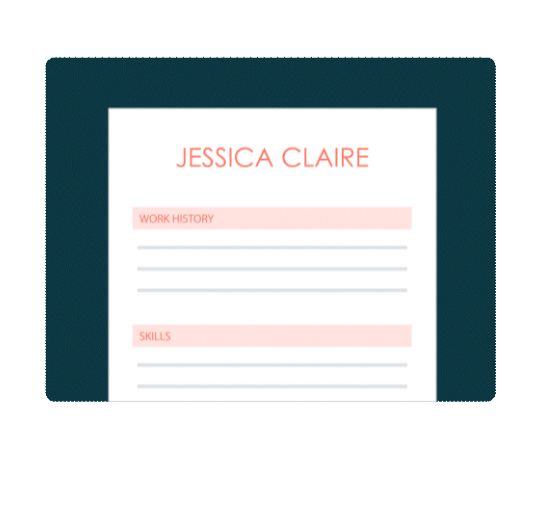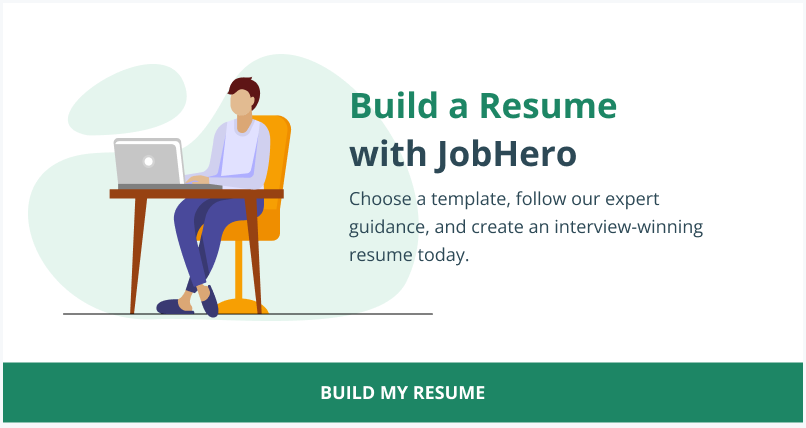Educational consultants are a fundamental asset for the career development of aspiring professionals. If you want to be part of this empowering career, this is the guide for you! Here we provide expert insight on how to become an education consultant. From job requirements to building an industry-specific resume, we feature the latest resume templates to help you excel in this new role.
Need cover letter guidance? Add a cover letter to your resume using our cover letter formats how-to guide and add value to your resume.
Impress your future boss! According to a 2020 survey, most hiring managers read cover letters for candidates they’re considering interviewing before making their final decision. Make a cover letter that seals the deal with our professionally designed cover letter templates.

Create your professional resume in just minutes.
- Choose from 20+ recommended templates
- Add pre-written experiences, skills and summary
- Download and send
What Does an Education Consultant Do?
Educational consultants provide independent academic and career technical advice for students and adults seeking continuous education. They also become a liaison for parents of special-needs children to identify grant and funding opportunities.
They help schools, individuals and families make the best educational decisions. An educational consultant provides advice to help students with college selection, admissions processes, filling out financial aid applications and preparing for college admissions tests.
Everyday duties of an educational consultant include:
Manage and implement the school policies.
Develop training programs for teachers.
Engage with school officials regarding the improvement of the school curriculum.
Circulate the policies to stakeholders.
Review and evaluate the various courses.
Active participation in meetings, conferences and workshops.
Know and prepare recommendations for educational aids.
Performs training and educational needs assessments.
Designs and implements training programs and workshops for educators.
Provides independent technical advice, consultation and individualized assistance.
Assesses local and state educational resources.
How to Become an Education Consultant
The Bureau of Labor Statistics is projected to grow 10% from 2021 to 2031, faster than the average for all occupations. This expected growth is due to an increased number of enrollments. As more people continue to seek postsecondary education to accomplish their career goals, more education consultants will be sought to serve the needs of these additional students. An education consultant can earn up to $60,510 per year. Here are the steps to becoming an education consultant.
Earn a bachelor’s degree:
To become an education consultant, you will need at least a bachelor’s degree; some institutions require a master’s degree. While getting your degree in a relevant field like education or cognitive science can be helpful, education consultants come from all backgrounds. To work in a school district, you will probably need a master’s degree in curriculum and instruction and a valid teaching certificate. School districts often look for education consultants who have specializations in the following areas:
- English and mathematics education
- Curriculum design
- Audiovisual education
- Emerging technology
- Blended learning
- Testing
Consider a master’s degree:
There are online master’s degree programs that help potential Education Consultants develop their expertise and prepare for job opportunities with more selective schools, universities and private clients. The M.Ed. in Curriculum and Instruction program covers Methods and Curriculum, Online Teaching and Learning, and STEAM (Science, Technology, Engineering, Arts and Mathematics).
Postgraduate certificate programs:
Some schools offer postgraduate certificate programs in educational or college consulting. These are available as both on-campus and online programs and are generally around 200 hours long and can be completed within a year. Other courses cover career assessment tools, financial planning, higher education selection processes, application essays and the admissions testing process. Students also learn testing theories, counseling techniques and a Human Resources Development (HRD) Model.
Memberships to jumpstart your career:
Membership in a professional organization, such as the Independent Educational Consultants Association or the Higher Education Consultants Association, is valuable to anyone pursuing this career as it increases their visibility to potential clients. Membership offers insurance, development opportunities, numerous tools discounts, and current information on relevant topics. The IECA requires a master’s degree or higher from an accredited institution, three years of experience in educational placement counseling or admissions, on-campus assessments, and professional references to become a member.
Create a job-winning resume:
Whether you are a seasoned education consultant or just started your career, your resume must be marketable and industry-specific to stand out from competing candidates. Highlighting your skills and experience. Start your career journey with a professional resume. Our resume builder will walk you through each step so that you can customize and optimize your resume. When submitting your resume, consider matching it to a cover letter for a solid opportunity to showcase your best credentials. Check out how other professionals present their qualifications in our unique cover letter samples.
Education Consultant Skills
Soft skills are essential in any consulting job. The ability to interact effectively with people is, therefore, vital. A strong work ethic shows professionalism, which people would want to see in someone they will take advice from. To be a successful consultant, you must balance hard and soft skills.
Education consultant hard skills:
Education consultant soft skills:
Insights from an Education Consultant
Sarah Seitz, founder of The Enrichery is a current Educational Consultant. We spoke to her to get an inside look on how to become an Educational Consultant. Here's what she shared.
What is the common career path for an education consultant?
I’m not sure if there’s a “common path”. My path looks like this: I began as a high school English teacher at a school with no college counselor. I took it upon myself to include a “College Essay” unit in class, and realized how much fun it was to help kids through the process. After a few years of doing this, I joined an independent company that specialized in college admissions. Once I started getting enough calls to my personal number asking for help, I started my own business. I have never looked back.
What should someone consider before becoming an education consultant?
I would consider if you’re okay with seasonal ups and downs. The job is one that has highs and lows and follows the school year. You’ll need to be mentally able to handle the slow periods.
What type of person excels in this job?
An educational consultant needs to be good at research. You’ll need to do a lot of digging to find out information about schools, and the information is constantly changing. Of course, you also need to be very personable, as families can tell you a lot of personal information (some of it shocking!).
What do you find to be the most rewarding aspect of being an education consultant?
Seeing kids move in a positive forward direction and hearing from them months later. It is really exciting to be a part of their personal growth and the opening of a new chapter.
How Much Do Education Consultant Get Paid?
Since the U.S. Bureau of Labor Statistics doesn't have salary data specifically for Educational Consultants, we will use the data supplied for postsecondary education administrators to get an idea of salary. They earned a median hourly wage of $42.59 in 2014. The lowest-paid make about $24.15 per hour, while the highest-paid can earn more than $83.79.
Top 10 States for Education Consultant Salary
Education Administrators in the following states make the highest median hourly wage in the U.S.
Education Consultant Resources
Looking for more information? We put together this list of additional resources to help you as you continue to explore a career as an Education Consultant.
On the Web
Inside Higher Ed Blogs
online source for news, opinion and jobs for all interested in higher education
EdWeek Blogs
publisher of Education Week and other print and online products on K-12 education, with an aim to raise awareness and understanding of critical issues facing American schools
On Twitter
Danny Brassell: @DannyBrassell
is a popular motivational speaker and an Educational Consultant. For two decades he has advised students from preschoolers to rocket scientists’.
Dr. Alec Couros: @courosa
a Professor, researcher and educator who has given many keynotes and workshops about connected/networked learning, digital citizenship, social media in education, and critical media literacy. He also provides educators, students, and parents with the knowledge to thrive in our new digital reality.
Industry Groups
Independent Educational Consultants Association
international professional association representing experienced Education Consultants that offers professional development opportunities to its members
Higher Education Consultants Association
focuses exclusively on independent college admissions consulting




